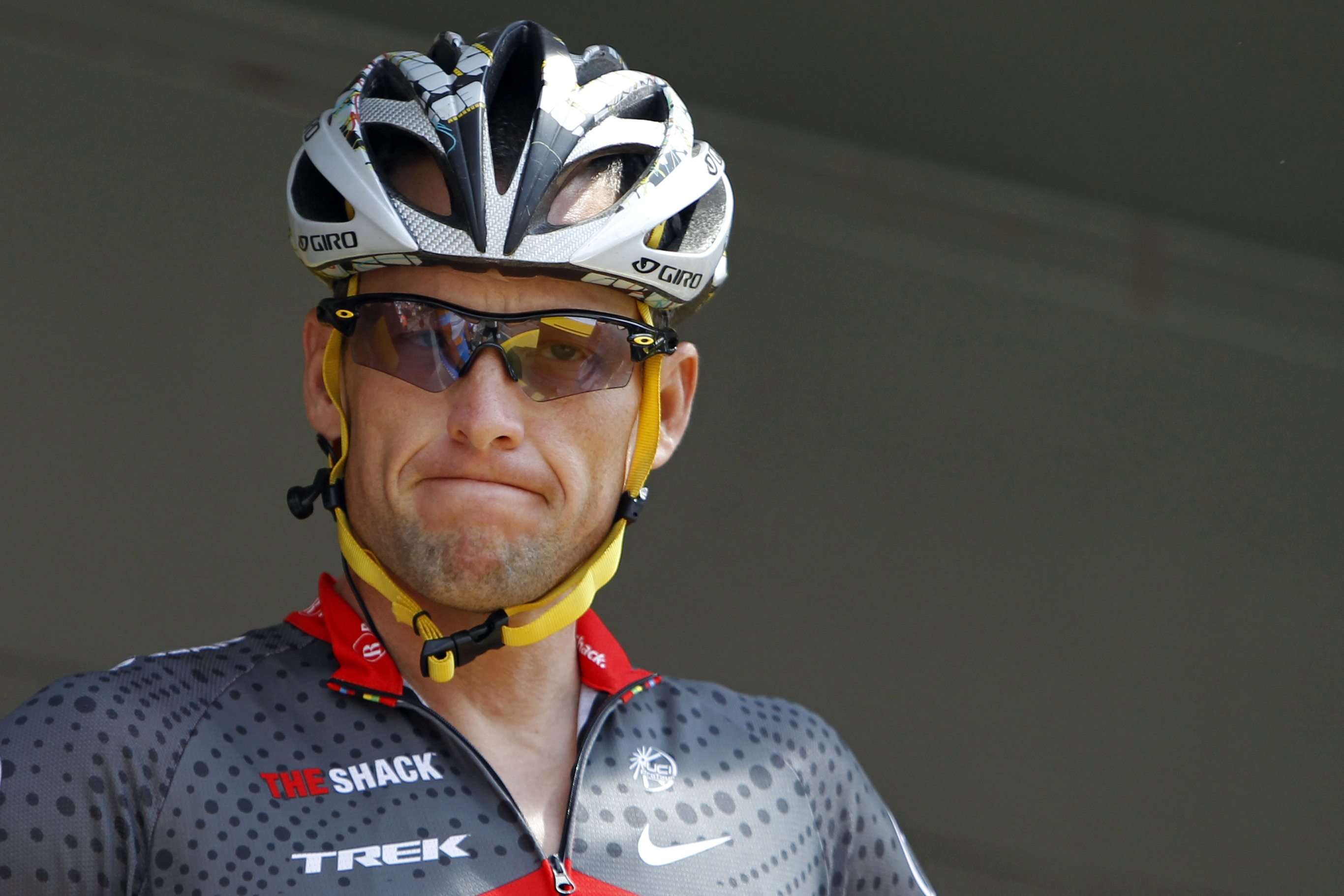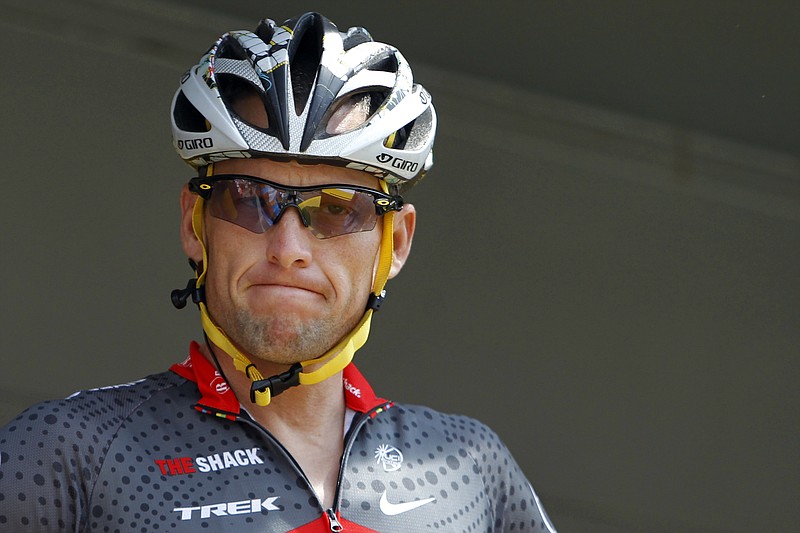 In this July 6, 2010, file photo, Lance Armstrong grimaces prior to the start of the third stage of the Tour de France cycling race in Wanze, Belgium. Armstrong said on Thursday, Aug. 23, 2012, that he is finished fighting charges from the United States Anti-Doping Agency that he used performance-enhancing drugs during his unprecedented cycling career, a decision that could put his string of seven Tour de France titles in jeopardy.
In this July 6, 2010, file photo, Lance Armstrong grimaces prior to the start of the third stage of the Tour de France cycling race in Wanze, Belgium. Armstrong said on Thursday, Aug. 23, 2012, that he is finished fighting charges from the United States Anti-Doping Agency that he used performance-enhancing drugs during his unprecedented cycling career, a decision that could put his string of seven Tour de France titles in jeopardy.AUSTIN, Texas - U.S. Anti-Doping Agency chief executive Travis Tygart said Friday night the agency will ban Lance Armstrong from cycling for life and strip him of his seven Tour de France titles for doping.
Earlier in the evening, Armstrong dropped any further challenges to USADA's allegations that he took performance-enhancing drugs to win cycling's premier event from 1999-2005.
Armstrong said USADA doesn't have the authority to vacate his Tour titles. However, Tygart told The Associated Press that USADA can do it.
Tygart called the Armstrong case a "heartbreaking" example of a win-at-all costs approach to sports.
Armstrong, who retired last year, declined to enter arbitration - his last option - because he said he was weary of fighting accusations that have dogged him for years. He has consistently pointed to the hundreds of drug tests that he has passed as proof of his innocence.
"There comes a point in every man's life when he has to say, 'Enough is enough.' For me, that time is now," Armstrong said in a statement sent to The Associated Press. He called the USADA investigation an "unconstitutional witch hunt."
"I have been dealing with claims that I cheated and had an unfair advantage in winning my seven Tours since 1999," he said. "The toll this has taken on my family and my work for our foundation and on me leads me to where I am today - finished with this nonsense."
USADA almost certainly will treat Armstrong's decision as an admission of guilt and hang the label of drug cheat on an athlete who was a hero to thousands for overcoming life-threatening testicular cancer and for his foundation's support for cancer research.
The agency can impose a lifetime ban and recommend Armstrong be stripped of his titles. That would put the question in the hands of the International Cycling Union, which has disputed USADA's authority to pursue the investigation and Tour de France officials, who have had a prickly relationship with Armstrong over the years.
Armstrong insisted his decision is not an admission of drug use, just a refusal to enter an arbitration process he believes is improper and unfair to athletes facing charges.
"USADA cannot assert control of a professional international sport and attempt to strip my seven Tour de France titles," he said. "I know who won those seven Tours, my teammates know who won those seven Tours, and everyone I competed against knows who won those seven Tours."
USADA maintains that Armstrong has used banned substances as far back as 1996, including the blood-booster EPO and steroids as well as blood transfusions - all to boost his performance.
The 40-year-old Armstrong walked away from the sport in 2011 without being charged following a two-year federal criminal investigation into many of the same accusations he faces from USADA. The federal probe was closed in February, but USADA announced in June it had evidence Armstrong used banned substances and methods - and encouraged their use by teammates. The agency also said it had blood tests from 2009 and 2010 that were "fully consistent" with blood doping.
Included in USADA's evidence were emails written by Armstrong's former U.S. Postal Service teammate Floyd Landis, who was stripped of his 2006 Tour de France title after a positive drug test. Landis' emails to a USA Cycling official detailed allegations of a complex doping program on the team.
USADA also said it had 10 former Armstrong teammates ready to testify against him. Other than suggesting they include Landis and Tyler Hamilton, both of whom have admitted to doping offenses, the agency has refused to say who they are or specifically what they would say.
"There is zero physical evidence to support [the] outlandish and heinous claims. The only physical evidence here is the hundreds of [doping] controls I have passed with flying colors," Armstrong said.
Armstrong sued USADA in Austin, where he lives, in an attempt to block the case and was supported by the UCI, the sport's governing body. A judge threw out the case on Monday, siding with USADA despite questioning the agency's pursuit of Armstrong in his retirement.
"USADA's conduct raises serious questions about whether its real interest in charging Armstrong is to combat doping, or if it is acting according to less noble motives," such as politics or publicity, U.S. District Judge Sam Sparks wrote.
Now the ultra-competitive Armstrong has done something virtually unthinkable for him: He has quit before a fight is over.
"Today I turn the page. I will no longer address this issue, regardless of the circumstances. I will commit myself to the work I began before ever winning a single Tour de France title: serving people and families affected by cancer, especially those in underserved communities," Armstrong said.
Armstrong could have pressed his innocence in USADA's arbitration process, but the cyclist has said he believes most people have already made up their minds about whether he's a fraud or a persecuted hero.
It's a stunning move for an athlete who built his reputation on not only beating cancer but forcing himself through grueling offseason workouts no one else could match, then crushing his rivals in the Alps and the Pyrenees.
